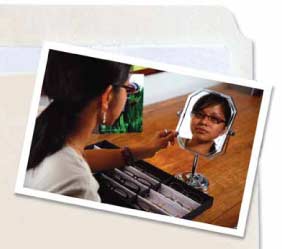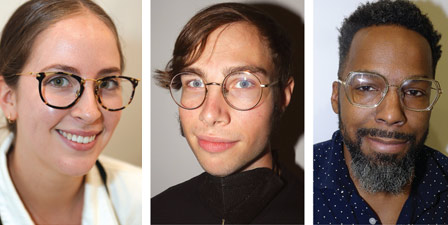 Last month, I discussed this definition: Selling is a process in
which the eyecare professional helps a patient to acquire all the
goods and/or services that would assist that patient to fulfill any
and all visual needs in exchange for compensation.
Last month, I discussed this definition: Selling is a process in
which the eyecare professional helps a patient to acquire all the
goods and/or services that would assist that patient to fulfill any
and all visual needs in exchange for compensation.
Keeping this in mind let me share with you a story I tell in my coaching sessions:
The strangest thing happened last month and the doctor you work for asked me to come in to explain the situation and ask you a question.
Dr. Smith was in San Francisco waiting to cross the street one day and he happened to notice a man on his cell phone and seemed oblivious to everything around him. All of a sudden, this man stepped off the curb and Dr. Smith grabbed him by the back of the collar and yanked him out of the way of a speeding car. The man thanked the doctor profusely for saving his life.
Two weeks later, the doctor finds in his mail a note from the man that read: Dear Dr. Smith: You’ll never know how much my family and I appreciate your effort in saving my life. Mere words cannot express our gratitude so please accept the enclosed gift as a small token of our appreciation. Very gratefully yours, Bill Gates.
Yes, that Bill Gates. The Bill Gates worth $53 billion. The token of his appreciation was a check for $100 million.
So, instead of shutting down his practice and buying an island in the South Pacific, Dr. Smith wants to do something special for his patients. For the next 12 months he wants you, his staff, to GIVE away ALL the eyewear your patients NEED. That means eyeglasses, sunglasses, contact lenses, lens treatments, spare pair, sports glasses, computer glasses, etc.
So, for inventory purposes and the fact that you know your patients far better than I… how many pairs of eyewear does the average patient coming to your practice usually need?”
You can imagine I very rarely ever hear “One pair.” On average, I hear three pair.
What’s interesting about this is that it has been reported 80 percent of the time, patients walk out of their eyecare professional’s office with only one pair of glasses. That is the exact opposite of the responses I get in my coaching sessions. Put aside the “sales” aspect of this
for a moment. If you, as an optometrist or an optician, assess and determine a patient has needs that would require more than one pair of glasses to ensure the health of their eyes, yet they walk out of your office with just one pair, did you satisfy all of this patient’s particular visual needs? I can hear all the “buts” right now: “But” the patient couldn’t afford it. “But” the patient’s insurance didn’t cover it. “But” the patient didn’t think they really needed it, etc.
I understand, but that is not the question. Did you satisfy all of this patient’s visual needs?
Your challenge is not that you don’t know how to determine a patient’s needs, in fact you are the expert at that. The challenge is in having the patient understand and OWN your assessment of their needs. Just telling them doesn’t guarantee this. However, if you were able to help them to discover, for themselves, what these needs are, they will ask you what they can do to meet these needs. They will actually seek, and more importantly, want your help. When this happens, you have implicitly just earned their trust.
Additionally, if Bill Gates did write you that check and you were giving away all the eyewear your patients need, would you dispense just the “basics” or would you dispense the best products available? And if you did dispense the basics, would your patients be satisfied with that?
Hopefully we changed your perspective a little. It’s just another step in understanding that our new definition of selling is a natural extension of your core values as an ECP.
Robert Bell is president (and head coach) of EyeCoach, an organization designed to teach and coach innovative and industry-specific sales techniques to eyecare professionals. You can contact him at [email protected].













